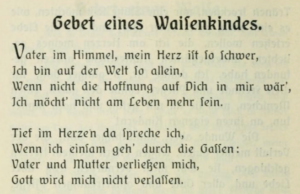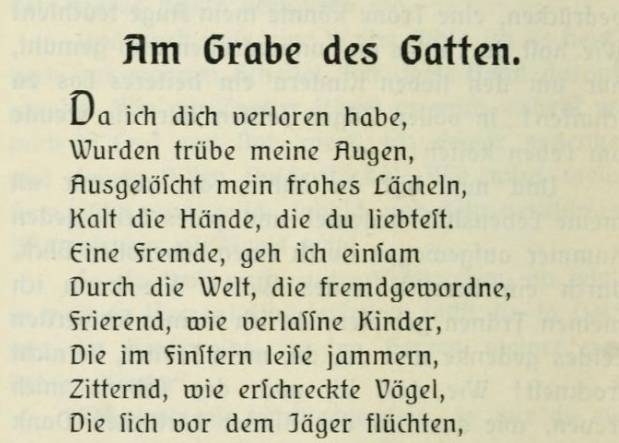Contributor(s): Shared on: Categories: Tags: | Source (German) | Paraliturgical Translation (English) |
|---|
Gebet eines Waisenkindes. |
Prayer of an orphan. |
Vater im Himmel, mein Herz ist so schwer,
Ich bin auf der Welt so allein,
Wenn nicht die Hoffnung auf Dich in mir wär’,
Ich möcht’ nicht am Leben mehr sein. |
Father in heaven, my heart is so heavy,
I am so alone in the world,
If it weren’t for the hope of You in me,
I would not be alive anymore. |
Tief im Herzen da spreche ich,
Wenn ich einsam geh’ durch die Gassen:
Vater und Mutter verließen mich,
Gott wird mich nicht verlassen. |
Deep in my heart I speak,
When I walk lonely through the alleys:
Father and mother left me,
God will not leave me. |
Vater und Mutter ruhen aus
Von mancher Not und Beschwerde,
Dennoch hab’ ich ein Vaterhaus
Über dem Lärmen der Erde. |
Father and mother rest
From many a hardship and complaint,
Yet I have a father’s house
Above the din of the earth. |
Dennoch stützt eine Vaterhand
Mich auf steinigen Pfaden
Und wird ins ewige Heimatland
Führen mich voller Gnaden. |
Yet a father’s hand supports
Supports me on stony paths
And will lead me to the eternal homeland
Lead me full of grace. |
Vater im Himmel, kein Kind ist so Dein,
Wie eine Waise im Leid,
Möchtest Du schützend doch bei mir sein
Jetzt und in Ewigkeit! |
Father in heaven, no child is so yours,
Like an orphan in sorrow,
May You be with me protectively
Now and forever! |
“Gebet eines Waisenkindes” by Lise Tarlau can be found in Rabbi Max Grunwald’s anthology of Jewish women’s prayer, Beruria: Gebet- und Andachtsbuch für jüdische Frauen und Mädchen (1907), page 530. The transcription of the German provided machine-readable text for machine translations by DeepL, which we then edited for accuracy and clarity. We welcome any/all corrections, improvements, and additional transcriptions and translations of this work’s contents. –Aharon Varady Source(s)
 Lise Tarlau (also known as L'Ysaye/Isaye/Ysaye/Ysale, Lisa, Lize, Elizabeth, Luise, and Louise Tarleau; 1879-1952), was a writer born to a prominent Viennese Bohemian Jewish family, the daughter of Rabbi Dr. Joseph Samuel Bloch and Laura Lachmann. In an essay published in 1906, "The Religious Problem," she expressed enthusiasm for Zionism and a deep sympathy for East European, Yiddish speaking Jewry, praising them for having retained their own distinctive cultural identity and their own language. This posture was accompanied by harsh criticism of Western European Jewish cultural assimilation, writing that they have “lived as parasites on the creative possibilities of the dreams of beauty of other peoples” (as quoted in Peter Singer's Pushing Time Away, 2003). Before emigrating to the United States in 1908, nearly two dozen prayers she wrote were published in Beruria (1907), an anthology of teḥinot in German compiled by her sister's husband Rabbi Dr. Max Grunwald. A decade later in the US, Houghton Mifflin Company and Riverside Press published The Inn of Disenchantment (1917), a collection of her prose and several short stories. Tarlau's fiction also appeared in major magazines of the day, including The Nation (105:2725, September 20, 1917), The Atlantic Monthly (in 1919), and Harper's Magazine. In 1924, her short story " Loutré" was awarded second place in Harper's first ever short story contest. During World War II, she wrote a number of scripts for radio and film and worked as a translator for the US military. Several of her works were included in The Fireside Book of Romance (ed. C. Edward Wagenknecht, 1948). She died on October 9, 1952 in Kew Gardens, Queens, Long Island, New York. Aharon Varady (M.A.J.Ed./JTSA Davidson) is a volunteer transcriber for the Open Siddur Project. If you find any mistakes in his transcriptions, please let him know. Shgiyot mi yavin; Ministarot naqeni שְׁגִיאוֹת מִי־יָבִין; מִנִּסְתָּרוֹת נַקֵּנִי "Who can know all one's flaws? From hidden errors, correct me" (Psalms 19:13). If you'd like to directly support his work, please consider donating via his Patreon account. (Varady also translates prayers and contributes his own original work besides serving as the primary shammes of the Open Siddur Project and its website, opensiddur.org.) Read a comment / Leave a comment (moderated) Works of related interest: |












Leave a Reply